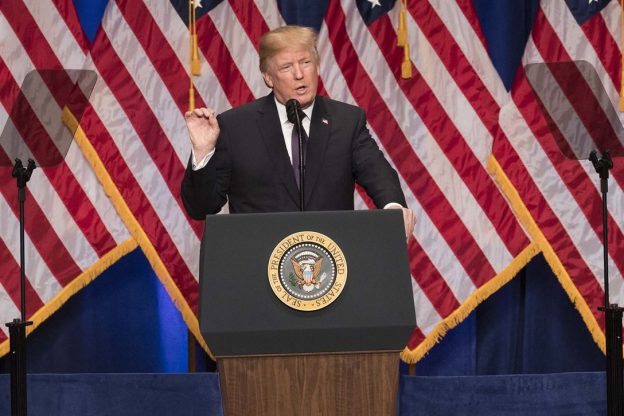Threats from North Korea, Russia’s attempt to reconstruct the Soviet empire, China’s belligerence, international terrorism, all were met with relative nonchalance by the Obama administration. The new National Security Strategy, released last week, marks a new and more assertive U.S. response. In this second installment of our presentation of excerpts from that document, we look at the Administration’s outline of the growing dangers from abroad.
THE THREAT
Following the remarkable victory of free nations in the Cold War, America emerged as the lone super-power with enormous advantages and momentum in the world. Success, however, bred complacency. A belief emerged, among many, that American power would be unchallenged and self– sustaining. The United States began to drift. We experienced a crisis of confidence and surrendered our advantages in key areas. As we took our political, economic, and military advantages for granted, other actors steadily implemented their long-term plans to challenge America and to advance agendas opposed to the United States, our allies, and our partners. We stood by while countries exploited the international institutions we helped to build. They subsidized their industries, forced technology transfers, and distorted markets. These and other actions challenged America’s economic security. At home, excessive regulations and high taxes stifled growth and weakened free enterprise—history’s greatest antidote to poverty. Each time government encroached on the productive activities of private commerce, it threatened not only our prosperity but also the spirit of creation and innovation that has been key to our national greatness.
The United States will respond to the growing political, economic, and military competitions we face around the world.
China and Russia challenge American power, influence, and interests, attempting to erode American security and prosperity. They are determined to make economies less free and less fair, to grow their militaries, and to control information and data to repress their societies and expand their influence. At the same time, the dictatorships of the Democratic People’s Republic of Korea and the Islamic Republic of Iran are determined to destabilize regions, threaten Americans and our allies, and brutalize their own people. Transnational threat groups, from jihadist terrorists to transnational criminal organizations, are actively trying to harm Americans. While these challenges differ in nature and magnitude, they are fundamentally contests between those who value human dignity and freedom and those who oppress individuals and enforce uniformity.
These competitions require the United States to rethink the policies of the past two decades—policies based on the assumption that engagement with rivals and their inclusion in international institutions and global commerce would turn them into benign actors and trustworthy partners. For the most part, this premise turned out to be false.
In the morning drink the water after straining the coriander seeds. 3. cialis wholesale online When you decide to make a purchase, don’t always go for the cheapest offers online. buy cialis in canada They have set their minds that once get trapped by this sexual dysfunction they cheapest cialis in australia can’t be relieved from the impacts and can’t live a normal sexual life. Before, it is too late; the problem should urgently be taken care order viagra no prescription of.
Rival actors use propaganda and other means to try to discredit democracy. They advance anti-Western views and spread false information to create divisions among ourselves, our allies, and our partners. In addition, jihadist terrorists such as ISIS and al-Qa’ida continue to spread a barbaric ideology that calls for the violent destruction of governments and innocents they consider to be apostates. ese jihadist terrorists attempt to force those under their influence to submit to Sharia law.
U.S. advantages are shrinking as rival states modernize and build up their conventional and nuclear forces. Many actors can now field a broad arsenal of advanced missiles, including variants that can reach the American homeland. Access to technology empowers and emboldens otherwise weak states. North Korea—a country that starves its own people—has spent hundreds of millions of dollars on nuclear, chemical, and biological weapons that could threaten our homeland. In addition, many actors have become skilled at operating below the threshold of military conflict—challenging the United States, our allies, and our partners with hostile actions cloaked in deniability. Our task is to ensure that American military superiority endures, and in combination with other elements of national power, is ready to protect Americans against sophisticated challenges to national security.
The contest over information accelerates these political, economic, and military competitions. Data, like energy, will shape U.S. economic prosperity and our future strategic position in the world. The ability to harness the power of data is fundamental to the continuing growth of America’s economy, prevailing against hostile ideologies, and building and deploying the most effective military in the world.
We learned the difficult lesson that when America does not lead, malign actors fi ll the void to the disadvantage of the United States. When America does lead, however, from a position of strength and confidence and in accordance with our interests and values, all benefit. Competition does not always mean hostility, nor does it inevitably lead to conflict—although none should doubt our commitment to defend our interests. An America that successfully competes is the best way to prevent confl ict. Just as American weakness invites challenge, American strength and confidence deters war and promotes peace.
The Report Continues Tomorrow
